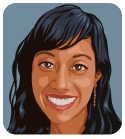According to Mexico’s 2000 General Housing and Population Census, nearly two million of Mexico’s approximately 100 million citizens are afflicted by a physical or mental disability. In a country with an average family size of four, that means eight million people are affected by disability on a personal level. Countless more have casual, day-to-day interactions with the disabled, whether at school, in shops or on the street.
Estela Villarreal’s mission is to improve the quality of life for those eight million people. She is the founder and director of Unidos Somos Iguales (United We Are Equal), a nonprofit organization that aims to better integrate people with disabilities into society by pairing them with non-disabled volunteers. In doing so, Unidos helps eliminate common misperceptions about disability. Founded in 1987 in Villarreal’s native Monterrey, Unidos now operates in 22 cities in five Mexican states and, she estimates, has indirectly or directly reached 200,000 people.
Villarreal knows the issue from firsthand experience. Two of her siblings suffered from mental retardation associated with Rubinstein-Taybi Syndrome, and their illness affected her entire family—particularly when they received comments or pointed looks from strangers. “Human beings are scared of what they don’t know,” she says.
Villarreal first tested her idea of encouraging interaction between disabled and non-disabled youth at a pilot summer camp when she was studying education in the 1980s. She found that stereotypes quickly disappeared once people understood their common humanity. While the quality of life for the disabled has improved in Mexico, thanks to medical developments and new laws that recognize rights of the disabled, Villarreal says the biggest challenge remains changing people’s attitudes. “Society expects physical solutions to disabilities,” she says, “but what we need is a cultural solution.”
To further that goal, Unidos has developed its original pilot project into a month-long summer camp in which 300 disabled and 300 non-disabled youth participate together in arts and crafts workshops, sports activities and field trips. During the year, approximately 3,000 Unidos volunteers, most of them aged 15 to 23, engage in monthly recreational activities with disabled young people, such as walking their dogs in the park, going to the movies or sharing a meal at a restaurant. And many have carried their interests into professional careers working with the disabled in rehabilitation centers or other occupations. The success of the program has inspired imitators elsewhere in Mexico. But Villa- rreal wants to expand her idea beyond Mexico’s borders and make it a global movement. “Disability is a universal issue,” she says. “People everywhere suffer from the same fear and the same stigma, and we’d like to change that wherever possible.”





